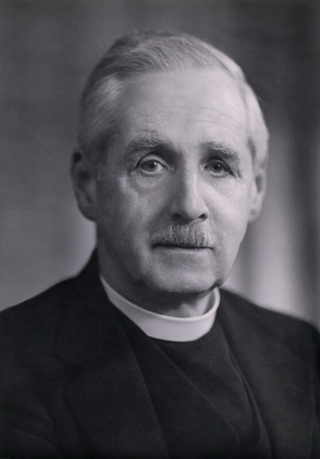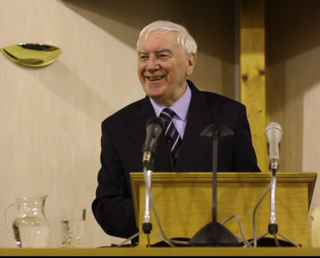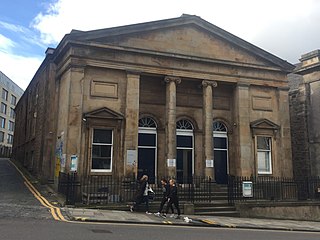
The Free Church of Scotland is a Scottish denomination which was formed in 1843 by a large withdrawal from the established Church of Scotland in a schism known as the Disruption of 1843. In 1900, the vast majority of the Free Church of Scotland joined with the United Presbyterian Church of Scotland to form the United Free Church of Scotland. In 1904, the House of Lords judged that the constitutional minority that did not enter the 1900 union were entitled to the whole of the church's patrimony ; the residual Free Church of Scotland acquiesced in the division of those assets, between itself and those who had entered the union, by a Royal Commission in 1905. Despite the late founding date, Free Church of Scotland leadership claims an unbroken succession of leaders going back to the Apostles.
The United Free Church of Scotland is a Scottish Presbyterian denomination formed in 1900 by the union of the United Presbyterian Church of Scotland and the majority of the 19th-century Free Church of Scotland. The majority of the United Free Church of Scotland united with the Church of Scotland in 1929.

The Free Presbyterian Church of Scotland was formed in 1893. The Church identifies itself as the spiritual descendant of the Scottish Reformation. The Church web-site states that it is 'the constitutional heir of the historic Church of Scotland'. Its adherents are occasionally referred to as Seceders or the Wee Wee Frees. Although small, the church has congregations on five continents.

John Baillie was a Scottish theologian, a Church of Scotland minister and brother of theologian Donald Macpherson Baillie.
The Free Church of Scotland is a conservative evangelical Calvinist denomination in Scotland. It is the continuation of the original Free Church of Scotland that remained outside the union with the United Presbyterian Church of Scotland in 1900, and remains a distinct Presbyterian denomination in Scotland.

Jennings Ligon Duncan III is an American Presbyterian scholar and pastor. He is Chancellor of Reformed Theological Seminary.
James Barr was a Scottish Old Testament scholar, known for his critique of the notion that the vocabulary and structure of the Hebrew language may reflect a particular theological mindset. At the University of Oxford, he was the Oriel Professor of the Interpretation of Holy Scripture from 1976 to 1978, and the Regius Professor of Hebrew from 1978 to 1989.
John MacLeod, known in Scottish Gaelic as Iain MacLeòid, was educated at the University of Aberdeen and the Free Church College, Edinburgh, and was a minister of the Free Church of Scotland (Continuing) who served in congregations of the Free Church of Scotland and Free Church of Scotland (Continuing) in Scotland and North America. He came to prominence in connection with allegations against Donald Macleod, Professor of Systematic Theology at the Free Church College: the professor was answerable to the Training of the Ministry Committee, of which Rev. MacLeod was clerk. This led, in January 2000, to an attempt to suspend him and over twenty other ministers from the functions of the ministry and to their formation of the "Free Church of Scotland Continuing", of which MacLeod was subsequently appointed the Principal Clerk of Assembly. He was moderator of the 2006 FCC General Assembly.

The Free Church of Scotland (Continuing) (abbreviation: FC(C), Scottish Gaelic: An Eaglais Shaor Leantainneach) is a Scottish Presbyterian denomination which was formed in January 2000. It claims to be the true continuation of the Free Church of Scotland, hence its name.

James B. Torrance was a Scottish Protestant theologian, biblical scholar and academic. He was Professor of Systematic Theology at the University of Aberdeen.
Donald Maclean (1869–1943) was a Scottish minister and theologian who played a significant role in the Free Church of Scotland during a period of ecclesiastical upheaval in the early 20th century. He was principal of the Free Church College in Edinburgh. He was appointed professor of church history and church principles in 1920, and principal in 1942, but died the following year. He also co-founded The Evangelical Quarterly.

Thomas Torrance (1871–1959) was a Scottish Presbyterian minister and Protestant missionary to Sichuan, western China. He was first sent there by the China Inland Mission (CIM), and later by The American Bible Society. He married Annie Elizabeth Sharpe (1883–1980) of the CIM in 1911. He was the father of the 20th century theologian, Thomas F. Torrance.

Donald Macleod was a Scottish theologian.
Iain Donald Campbell was a minister and former Moderator in the Free Church of Scotland. He was a prolific author on a range of Biblical topics and church history. Campbell died in January 2017, and it subsequently emerged that he killed himself due to revelations surrounding Campbell having multiple extra-marital affairs with members of his congregation.
John Kennedy Cameron was a minister of the Free Church of Scotland who served as Moderator of the General Assembly in 1910/11.
Angus MacRae is a minister of the Free Church of Scotland who served as Moderator of the General Assembly 2018/2019.
Roderick Alick Finlayson (1895–1989) was a Scottish minister of the Free Church of Scotland who served as Moderator of the General Assembly in 1945. In authorship he is usually R. A. Finlayson.

The King's Hall is a church in Newington, Edinburgh, Scotland. Constructed as Newington Free Church in 1843, it is now used by Community Church Edinburgh: an independent evangelical congregation.

St Oran's Church was a Gaelic-speaking congregation of the Church of Scotland in Edinburgh. Originating in the early 18th-century, the congregation continued until 1948, latterly meeting at Broughton Street.










